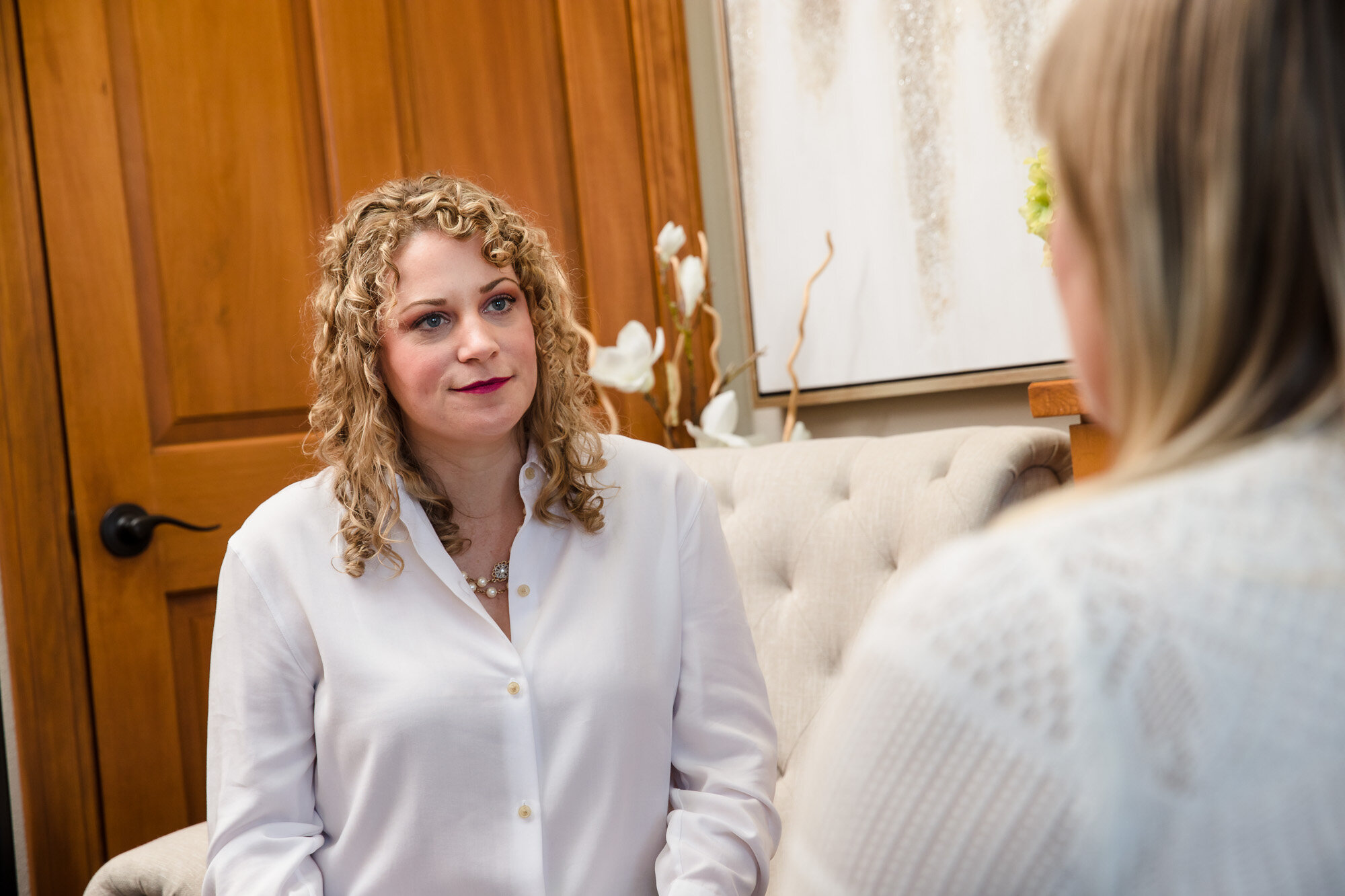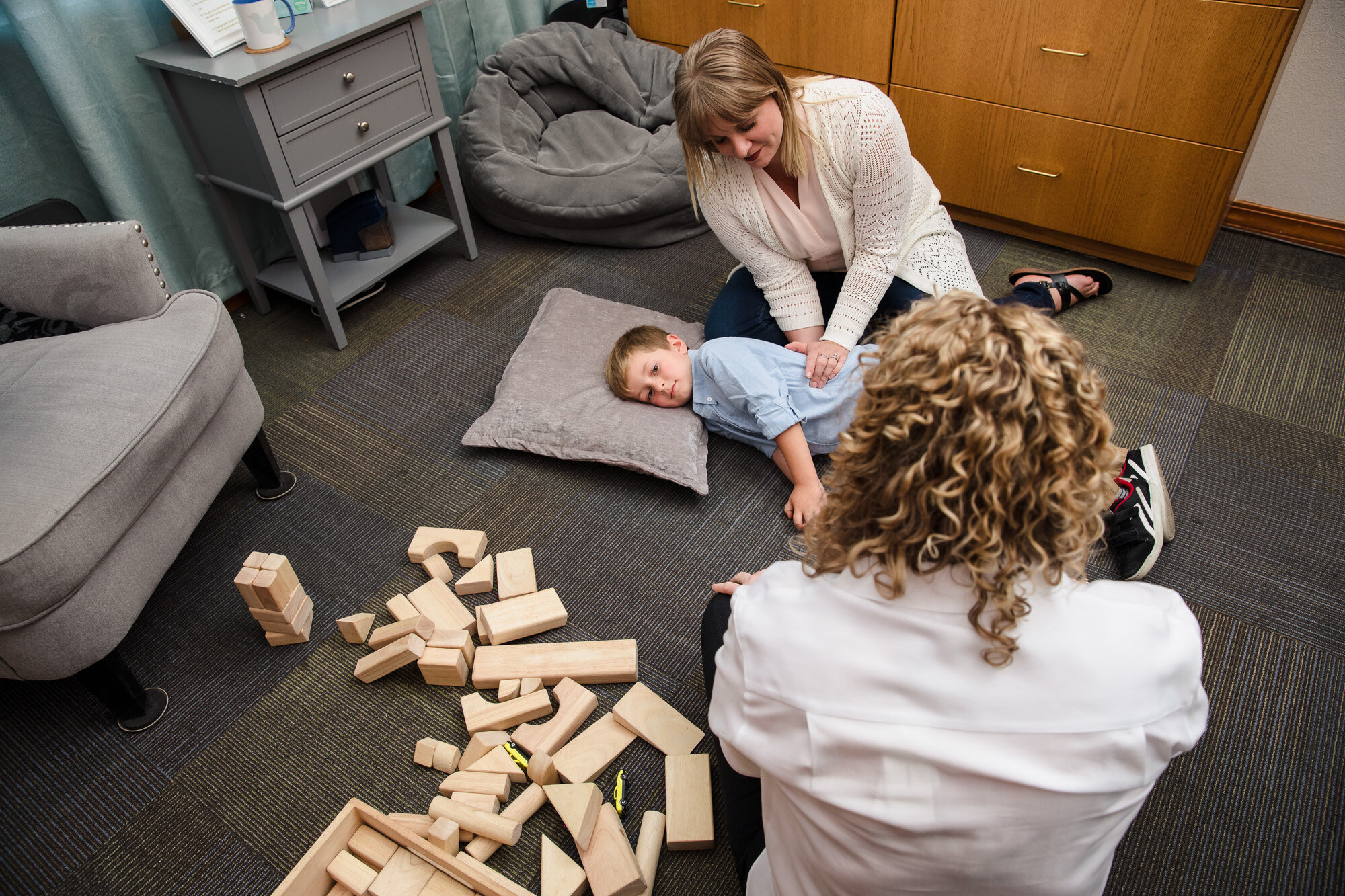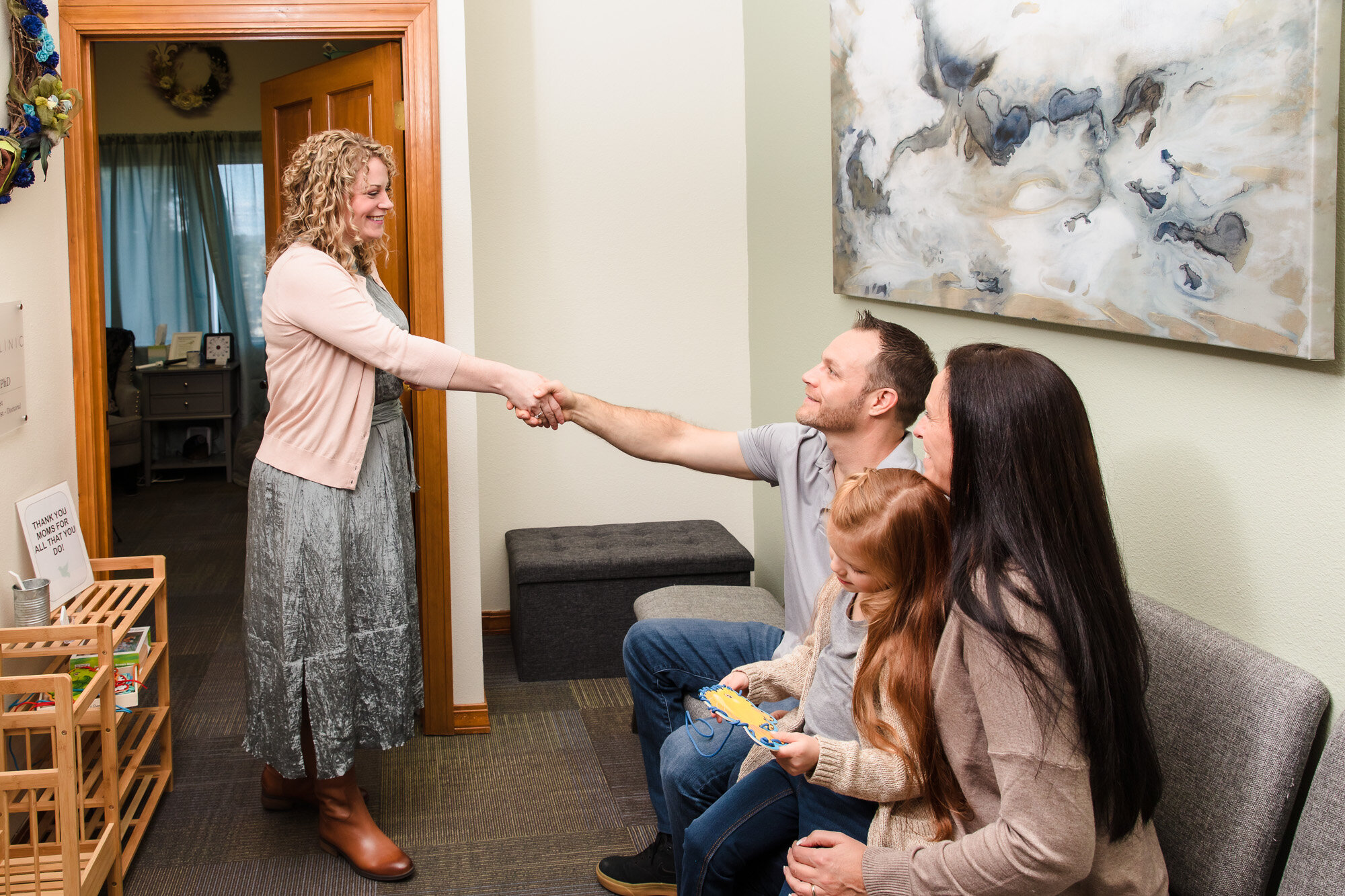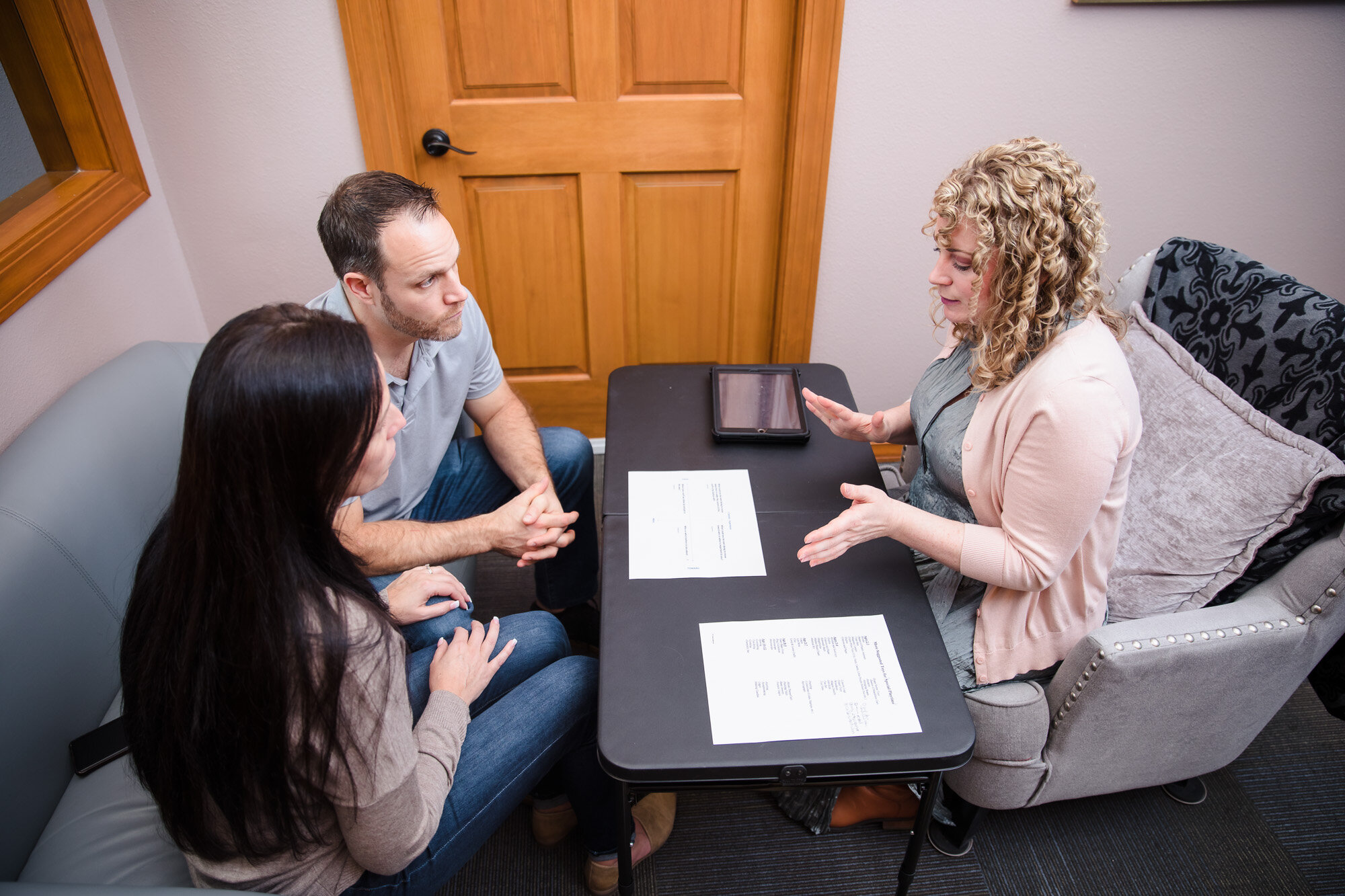Dr. Hayward provides information about how to request from your private insurance that her services are covered under in-network rates, rather than out-of-network rates. If approved by your insurance, this can reduce the costs of services considerably, depending on your plan.
Read MoreWhat do you do when your kid has just a tiny, little difficulty?
Dr. Blevins discusses when a parent has a behavior or development concern for their child, but it doesn't quite feel like it's big enough to see a specialist. When you feel there probably isn't a diagnosis, what do you do? She's discussing her thoughts on how parents might approach these tough questions.
Read MoreAlternative Treatments
Today we are talking about alternative treatments for supporting your child's behavior. Alternative treatments might be things like essential oils, elimination diets, using the moon to decide when you will go out for fun activities versus hunkering down in anticipation of naughty behavior, and other types of old wives tales and Instagram / Pinterest wisdom that is not necessarily linked to evidence-based studies. Many providers, including physicians, psychologists, therapist, and others, get this question all the time. It's a very important question because it frames the way that you as a parent will approach treatment for your child and the energy and attributions you give to interventions along your child's journey.
Read MoreValues-Based Scheduling
It's hard to feel like you're moving toward your big goals and living your best life when there is always a load of laundry that needs folding or homework that needs to be completed. Today's video talks about framing your schedule in the context of your big values for your family, so that you don't get lost or overwhelmed by the mundane daily life stuff. When we focus on how the smallest of our actions contributes to teaching our children how to live out the values we most aspire to, it makes it a bit easier to do those tasks with joy, patience, and purpose. I provide a couple strategies to get you started with values-based scheduling. Let me know how it goes!
Read MoreWhy doesn't my child listen to me?
I'm sharing a parent question and answer video I made from my new Facebook group, Positive Parenting Q and A, today.
Today's video focuses on understanding why a child might be responsive and compliant with one parent and not with the other parent and how I address it in therapy. This is a very COMMON question!
I discuss three big reasons for this phenomenon. I also discuss how I approach healing the parent-child relationship to…
Treating Lice: Cultural Dimensions & What Teachers and Parents Can Do
Today I'm chatting with Certified Lice Technician, Danni Hall. She is the owner of The Alaska Lice Clinic, LLC. We have a rich discussion about a common childhood problem that shows up from time to time. We discuss how schools might stop the spread of a lice outbreak, how parents can help prevent their child from getting lice, and how cultural factors have led to some school policy changes since I was a kid. I have to say that this conversation was so GOOD, and I hope that you all out there get as much out of as I did.
Read MoreTeaching Your Kids About Money
I’m so excited to unveil my new interactive Facebook group: Positive Parenting Q and A! You can submit questions and I answer them through facebook live each week. You can also let me know here if you want me to seek out information about a specific topic for learning videos. I’m so excited to chat with you more!
Two financial planners, Sarah and Katie, and a child psychologist, Dr. Leslie Blevins, chat about the ways that parents can teach their children healthy money skills and money mindset from an early age. We discuss earning an allowance and how to use allowance in consequences when your kid makes a mistake. Should you take away your kid's allowance? We also talk about
Read MoreCoparenting Therapy
I'm chatting with clinical psychologist, Tiffany Rochester, in Perth, Australia. She specializes in coparenting therapy for divorced and separated parents who aim to work together for the betterment of their child(ren). We discuss what coparenting means, the mindset of providers and parents in effective and ineffective coparenting therapy, the role of the legal system, and common themes of emotions that children display. Many parents have described to me that they feel they're coparenting with
Read MoreHow to Teach Your Child to Have a Healthy Relationship with Food (and to Eat Well)
I'm chatting with Michelle Winebender, a Registered Dietitian and Nutritionist for over 25 years (and a good friend of mine). We chat about how to create healthy eating habits in young children so that they grow up to have a good relationship with food. Michelle helps with the super common questions I get "Is my kid eating enough?" and "Will my child get a nutrient deficit if I can't get them to eat more variety?"
Read MoreWhat's Really in Washington State's New Sex Ed Bill? | A Conversation on Sex Health Education
Dr. Blevins interviews Laurie Dils, Program Supervisor for Sexual Health Education at the Office of Superintendent of Public Instruction (OSPI) regarding Bill 5395, the new sex ed bill recently signed into law by Governor Inslee. The bill is currently on referendum fall 2020 for public vote.
Ms. Dils and Dr. Blevins talk through the intention, historical context, and outline of the bill, especially for the kindergarten through third grade social-emotional requirements and the fourth and fifth grade puberty requirements. Ms. Dils also addresses some misinformation on social media about the bill that is prominent on social media.
For parents and educators outside of Washington, this is a good conversation about sex ed generally and how schools play a role and think through the process of helping students through this part of development.
Read MoreFlexible home learning schedule | How to Keep kids engaged
We're taking a break from expert chats today so I can bring you information that I believe is awesome and super helpful to creating a learning-at-home schedule that benefits your child and you.
I'll go into the one big secret that teachers have been doing in Finland's schools for a while now. It helps increase attention and productivity in kids, promotes better mood, and is associated with higher achievement scores and better brain development.
Read MoreYoung Family Estate Planning
Today's video is the second in a three-video series on supporting your child in the financial domain. A couple of week's ago I addressed college (and other after-high-school pursuits) planning. In a few weeks I'll be addressing growing financial skills through intentional parent-led teaching by interviewing Thomas Corley, an award-winning author.
Today I am chatting with Randi Johnson of Lilac City Law about young family estate planning. Estate planning is putting in writing (so everyone is clear) your wishes for your children in the unfortunate event of your and their other parent's passing. We will discuss estate planning for typically developing children and the concerns involved when raising a child with special needs.
Specifically, we'll look at considering power of attorney versus guardianship when your child becomes an adult, choosing a guardian and the different types of guardians, examining what a trust is and how it can provide
Read MoreCouple's Counseling and How It Can Help with Parenting
Dr. Blevins is continuing her expert chats this week with Billie Tyler, MS, LMFT out of Spokane, WA who specializes in relationship counseling. She uses the Gottman approach, Emotion Focused Therapy, and Solution Focused Therapy as her orientations. Our conversation includes an overview of what couple's therapy is and the way it can help parents to reach their parenting goals. They discuss how relationship therapy may come on the radar for parents, what some common difficulties are that Billie sees, and the benefits of establishing healthy communication early in any relationship. You can learn more about Billie Tyler, MS, LMFT at https://billietylertherapy.com.
Read MoreFunding College: Info for special needs and traditional students
Dr. Blevins chats with Katrina Roy and Peter Tassoni, both employed with the state of Washington, about considerations for college financial planning. Planning for both special needs and typically developing children are covered.
Download the presentation here: https://teachdirections.enildaclinic.com/funding-college
Questions covered include:
1. What might be additional factors to consider, financial opportunities, or hurdles to overcome when planning for college if a child has special needs?
2. What if your child is considered disabled and won’t get a traditional college credential. Is funding available for them?
3. For typically developing kids, what’s the ideal planning path?
4. For typically developing kids, if I haven’t planned and my kid is now in high school, what should I be doing to best prepare for a good financial situation with them in college?
5. What is my child’s responsibility (at various ages) that I can encourage them to do to contribute to their college financial health?
Read MoreBook Review: a kids book about racism by Jelani Memory
In honor of our society's awakening to social injustice and a deeper need to hear from more diverse voices, today's learning video is a book review of a kids book about racism by Jelani Memory. The book does a great job of providing structure to help guide parents in a conversation about racism with their children without giving explicit examples, which might be age-inappropriate for some kids. This allows parents to tailor their own examples to a child's maturity level, making the book one you can come back to time and again as your child gets older and their understanding of the world grows.
I am having a give away for two copies of a kids book about racism. You may enter the giveaway by responding to this email (FrontDesk@EnildaClinic.com) with learning video topics that are of interest to you! The giveaway will end August 11, 2020.
Relaxing Your Body | Managing Stress
If you're like me, you've been a bit more stressed recently. It's hard not to be. On top of normal everyday life stress, we're having a pandemic and a long awaited social awakening to systemic racism.
It's hard to be present and feel 100% everyday. So, I wanted to share how I'm taking care of myself. I'm specifically going to focus on mindfulness and body awareness. They go hand-in-hand, of course. And if you feel this is a little woo woo of a topic, just hold on through the next paragraph...
Psychiatrist Bessel Van Der Kolk, M.D. wrote a New York Times Best Seller on trauma and the body, The Body Keeps the Score, that went into amazing detail about how our bodies hold the scars of emotional, verbal, and systemic trauma (in addition to physical trauma of course) through dysregulation of our fight or flight or freeze response. In the short term this can lead to poor sleep, digestive distress, and irritability. But, the long term consequences can be devastating. The ACEs Study found that chronic diseases, like hypertension, alcoholism, depression, drug abuse, eating disorders, obesity, and other poor future behaviors and outcomes, like high-risk sexual behaviors, smoking, and suicide and more likely to occur in adulthood with increased risk factors in childhood, including multiple forms of trauma. See ACEs Info here.
When I work with a child, I always consider …
Restrictive and Repetitive Behaviors in High Functioning ASD
This week's learning video discusses restrictive and repetitive behaviors (RRBs) as they are sometimes seen in high functioning (HFA) individuals with Autism Spectrum Disorder (ASD).
I often see, and many psychologists describe, that children and adults who have reached a higher level of adaptive functioning, or higher cognitive (thinking) skills level, will present differently than a moderately or low functioning person with ASD. First I'll provide some context for how I most often have seen HFA in my private practice among young children and when evaluating a range of ages up through adulthood.
A person with HFA can better compensate because …
Building Routines and Habits During Summer
It's finally summer!! The stress of homeschooling is over. The governor in Washington just announced that schools will be taking students in for a physical open in the fall. Ahhhh!!!
You deserve a break! You've worked hard doing multiple jobs for 3 months straight. Go ahead and plan that getaway!!
Today's learning topic is for when you come back rejuvenated from break and the kids are settling into their summer routine. Just before they start in with the "I'm bored" statements. Today's topic is about reducing kid frustration and increasing their cooperativeness through environmental arrangement.
Specifically, environmental arrangement is …
Last Week of School | Reflection Activity
You did it!!!
I hope your summer is filled with sun, warmth, and fun. You deserve it!
Before you get started, I want to encourage you to take a few minutes to reflect with your child on how you two (three, four...) worked together these last few months. I have a fun, coloring activity for you to help!
Why?! Because you've stretched yourself and grown so much. It's worth seeing how you've filled those little spaces and accommodated a whole new career (being a teacher!) while still doing all the many other duties of being a parent. I imagine your patience, skill in organizing and prioritizing, and communication have grown. I work with many perfectionistic parents... how did that attribute take a hit these last few months? Are you way more flexible now?
It's important to celebrate your own growth, and to really recognize the skills and resources you used to pull off these last few months. It's important that your child recognize it in themselves and you too. I bet they learned some things about how their brain learns. Many children I know have learned they need to get up and move more than they ever did at school. And they learn better because of it. Did your child learn how to manage their time and to interrupt you less? Maybe that's something they're still working on?? Or, maybe they learned that Mommy does really important things at her job. Or that she helps little brother too, so it's important to wait.
Too often I see parents rush into the next phase of life right after the last hurdle. This creates a sense of always trying to tread water. Pausing for reflection on our strengths and how we've grown helps us to mark the time, joy, achievement, giving us a sense of calm and satisfaction. Additionally this school year, many school celebrations have been cancelled or disrupted. So, yes, you are so key and important to helping your child with this step.
Watch the video for detailed instructions on the coloring activity, and Celebrate!!
Warmly,
Dr. Blevins
Things on My Mind | Therapy for Kids
In today's video I am answering some of the questions I get from time to time from parents. I'm also chatting about some of the things that I find there to be confusion about regarding this weird time of stay-at-home orders.
The big take away is that there is still behavioral health support available to you, your child, and family. Just reach out to your preferred provider or PCP to figure out exactly what kind of services you may need and how to most safely access those services.
I, and many of my colleagues, have made note of the increased stress that parents and kids are experiencing recently. And daily stress can take it's toll.
You and your family deserve to have support and tools to manage that stress as best as you can. Even if you wouldn't say it's a "problem," you can still pick up some tools to feel better equipped with the day-to-day grind that is so hard for so many people right now. Whether you want a one- or two-session consult or traditional therapy that leads to big transformation of a more prominent difficulty, the behavioral health workforce is up and running!
I'm still feeling so inspired by the compassion that our world is showing to each other during the pandemic. Remember that self-compassion and refueling your tank will allow you to continuing being the rock star that you are!
Warmly,
Dr. Blevins






